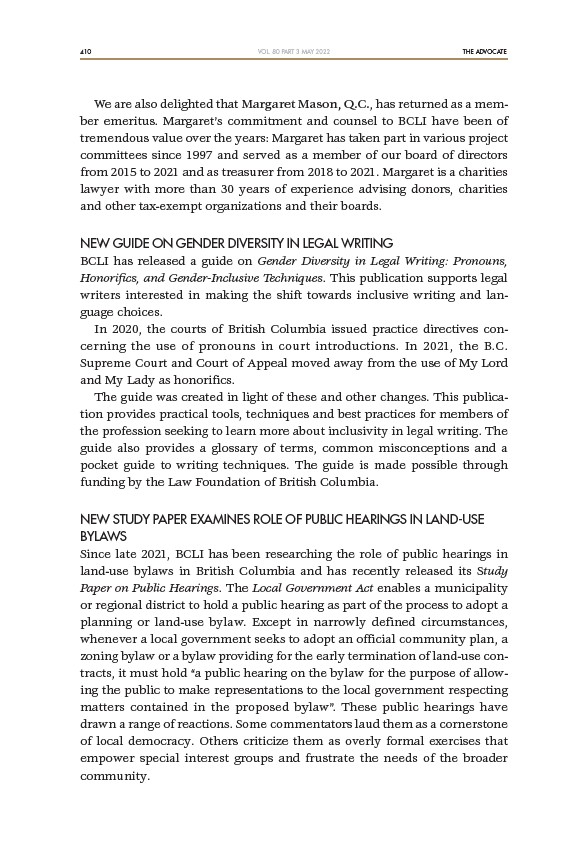
410 THE ADVOCATE
VOL. 80 PART 3 MAY 2022
We are also delighted that Margaret Mason, Q.C., has returned as a member
emeritus. Margaret’s commitment and counsel to BCLI have been of
tremendous value over the years: Margaret has taken part in various project
committees since 1997 and served as a member of our board of directors
from 2015 to 2021 and as treasurer from 2018 to 2021. Margaret is a charities
lawyer with more than 30 years of experience advising donors, charities
and other tax-exempt organizations and their boards.
NEW GUIDE ON GENDER DIVERSITY IN LEGAL WRITING
BCLI has released a guide on Gender Diversity in Legal Writing: Pronouns,
Honorifics, and Gender-Inclusive Techniques. This publication supports legal
writers interested in making the shift towards inclusive writing and language
choices.
In 2020, the courts of British Columbia issued practice directives concerning
the use of pronouns in court introductions. In 2021, the B.C.
Supreme Court and Court of Appeal moved away from the use of My Lord
and My Lady as honorifics.
The guide was created in light of these and other changes. This publication
provides practical tools, techniques and best practices for members of
the profession seeking to learn more about inclusivity in legal writing. The
guide also provides a glossary of terms, common misconceptions and a
pocket guide to writing techniques. The guide is made possible through
funding by the Law Foundation of British Columbia.
NEW STUDY PAPER EXAMINES ROLE OF PUBLIC HEARINGS IN LAND-USE
BYLAWS
Since late 2021, BCLI has been researching the role of public hearings in
land-use bylaws in British Columbia and has recently released its Study
Paper on Public Hearings. The Local Government Act enables a municipality
or regional district to hold a public hearing as part of the process to adopt a
planning or land-use bylaw. Except in narrowly defined circumstances,
whenever a local government seeks to adopt an official community plan, a
zoning bylaw or a bylaw providing for the early termination of land-use contracts,
it must hold “a public hearing on the bylaw for the purpose of allowing
the public to make representations to the local government respecting
matters contained in the proposed bylaw”. These public hearings have
drawn a range of reactions. Some commentators laud them as a cornerstone
of local democracy. Others criticize them as overly formal exercises that
empower special interest groups and frustrate the needs of the broader
community.